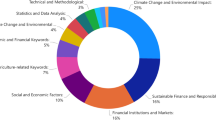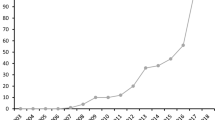Abstract
This research examines green finance’s role in mitigating environmental concerns in China. The significance of the tax code for environmental protection is examined in detail. The research examines the association between green financing and lowering environmental hazards using regression analysis tests, dummy estimation techniques, and robustness analysis on data collected between 2003 and 2018. This research demonstrates that the Environmental Protection Tax Law is a valuable policy instrument for advancing environmentally responsible financing and addressing environmental issues. Green money was shown to be associated with lower environmental hazards. This study’s results imply that tax legislation has been implemented to safeguard the environment in China, and more money has been placed into environmentally beneficial initiatives. The impact of environmental protection legislation on greenhouse gas emissions, urbanization, and CO2 emissions is also highlighted. These findings are significant for environmentalists, policymakers, and the financial and banking sectors because they demonstrate how to develop effective strategies to advance green finance and mitigate ecological threats.
Similar content being viewed by others
Data availability
The data that support the findings of this study are openly available on request.
References
Aizawa M, Yang C (2010) Green credit, green stimulus, green revolution? China’s mobilization of banks for environmental cleanup. J Environ Dev 19(2):119–144
Bhatnagar S, Sharma D (2022) Evolution of green finance and its enablers: a bibliometric analysis. Renew Sust Energ Rev 162:112405
Cai W, Bai M, Davey H (2022) Implementing environmental protection tax in China: an alternative framework. Pac Account Rev
Chang L, Iqbal S, Chen H (2023) Does financial inclusion index and energy performance index co-move? Energy Policy 174:113422
Chin MY, Ong SL, Ooi DBY, Puah CH (2022) The impact of green finance on environmental degradation in BRI region. Environ Dev Sustain:1–16. https://doi.org/10.1007/s10668-022-02709-5
Fang G, Yang K, Chen G, Tian L (2023) Environmental protection tax superseded pollution fees, does China effectively abate ecological footprints? J Clean Prod 388:135846
Gao X, Liu N, Hua Y (2022) Environmental Protection Tax Law on the synergy of pollution reduction and carbon reduction in China: evidence from a panel data of 107 cities. Sustain Prod Consump 33:425–437
Gilchrist D, Yu J, Zhong R (2021) The limits of green finance: a survey of literature in the context of green bonds and green loans. Sustainability 13(2):478
Han F, Li J (2020) Assessing impacts and determinants of China’s environmental protection tax on improving air quality at provincial level based on Bayesian statistics. J Environ Manag 271:111017
He Y, Wen C, Zheng H (2021) Does China’s environmental protection tax law effectively influence firms? Evidence from stock markets. Emerg Mark Financ Trade 57(15):4436–4447
He Y, Zhu X, Zheng H (2022) The influence of environmental protection tax law on total factor productivity: evidence from listed firms in China. Energy Econ 113:106248
Iqbal S, Bilal AR (2021) Energy financing in COVID-19: how public supports can benefit? China Finance Rev Int 12(2):219–240
Iqbal S, Bilal AR, Nurunnabi M, Iqbal W, Alfakhri Y, Iqbal N (2021) It is time to control the worst: testing COVID-19 outbreak, energy consumption and CO2 emission. Environ Sci Pollut Res 28:19008–19020
Jia Q (2023) The impact of green finance on the level of decarbonization of the economies: an analysis of the United States’, China’s, and Russia’s current agenda. Bus Strateg Environ 32(1):110–119
** Y, Gao X, Wang M (2021) The financing efficiency of listed energy conservation and environmental protection firms: evidence and implications for green finance in China. Energy Policy 153:112254
Li C, Umair M (2023) Does green finance development goals affects renewable energy in China. Renew Energy 203:898–905
Li W, Chien F, Ngo QT, Nguyen TD, Iqbal S, Bilal AR (2021) Vertical financial disparity, energy prices and emission reduction: empirical insights from Pakistan. J Environ Manage 294:112946
Liu G, Yang Z, Zhang F, Zhang N (2022) Environmental tax reform and environmental investment: a quasi-natural experiment based on China’s Environmental Protection Tax Law. Energy Econ 109:106000
Liu N, Liu C, **a Y, Ren Y, Liang J (2020) Examining the coordination between green finance and green economy aiming for sustainable development: a case study of China. Sustainability 12(9):3717
Liu Z, Tao Y, Tian G (2019) Change of China’s “green” financial policy and its allocation efficiency--an empirical study based on the listed companies of China’s eco-industry. Ekoloji 28(107):3701–3714
Long F, Dong Z, Ge C, Tian X, Yuan Z, Bi F, Lian C (2022) Latest progress review of China’s environmental protection tax policy implementation. Environ Strat Plan China:185–204
Lu J (2022) Can environmental protection tax aggravate illegal pollution discharge of heavy polluting enterprises? Environ Sci Pollut Res 29(22):33796–33808
Mpofu FY (2022) Green taxes in Africa: opportunities and challenges for environmental protection, sustainability, and the attainment of sustainable development goals. Sustainability 14(16):10239
Peng G, Wang T, Ruan L, Yang X, Tian K (2023) Measurement and spatial–temporal analysis of coupling coordination development between green finance and environmental governance in China. Environ Sci Pollut Res 30(12):33849–33861
Rahman S, Moral IH, Hassan M, Hossain GS, Perveen R (2022) A systematic review of green finance in the banking industry: perspectives from a develo** country. Green Financ 4:347–363
Tu Q, Wang Y (2021) New environmental protection taxes in China from the perspective of environmental economics. Discret Dyn Nat Soc 2021:1–10
Wang J, Lin J, Feng K, Liu Y, Jiao X, Ni R et al (2021) Towards reducing inter-city economic inequality embedded in China’s environmental protection tax law. Environ Res Lett 16(12):124007
Wang Y, Zhi Q (2016) The role of green finance in environmental protection: two aspects of market mechanism and policies. Energy Procedia 104:311–316
Wu J, Tal A (2018) From pollution charge to environmental protection tax: a comparative analysis of the potential and limitations of China’s new environmental policy initiative. J Comp Policy Anal: Res Pract 20(2):223–236
Xu Y, Li S, Zhou X, Shahzad U, Zhao X (2022) How environmental regulations affect the development of green finance: recent evidence from polluting firms in China. Renew Energy 189:917–926
Yang Y, Liu Z, Saydaliev HB, Iqbal S (2022) Economic impact of crude oil supply disruption on social welfare losses and strategic petroleum reserves. Resour Policy 77:102689
Yang S, Wang C, Lyu K, Li J (2023) Environmental protection tax law and total factor productivity of listed firms: promotion or inhibition? Front Environ Sci 11:589
Zhang S, Wu Z, Wang Y, Hao Y (2021) Fostering green development with green finance: an empirical study on the environmental effect of green credit policy in China. J Environ Manag 296:113159
Zhang Z, Linghu Y, Meng X, Yi H (2023) Research on the carbon emission reduction effects of green finance in the context of environment regulations. Econ Res -Ekonomska Istraživanja 36(1):2179513
Zhao L, Saydaliev HB, Iqbal S (2022) Energy financing, COVID-19 repercussions and climate change: implications for emerging economies. Clim Chang Econ 13(03):2240003
Zheng X, Zhou Y, Iqbal S (2022) Working capital management of SMEs in COVID-19: role of managerial personality traits and overconfidence behavior. Econ Anal Policy 76:439–451
Funding
This work was sponsored in part by the Major Program of Chinese Ministry of Education Key Research Institute in University: “Research on Ecological Civilization and Evolution of Environmental Law Functions” (NO. 19JJD820004).
Author information
Authors and Affiliations
Contributions
Conceptualization and data collection, methodology, software and validation, writing of original draft: Zhongming **a.
Corresponding author
Ethics declarations
Ethical approval and consent to participate
The authors declared that they have no known competing financial interests or personal relationships, which seem to affect the work reported in this article. We declare that we have no human participants, human data, or human issues.
Consent for publication
We do not have any individual person’s data in any form.
Competing interests
The authors declare no competing interests.
Additional information
Responsible Editor: Guilherme Luiz Dotto
Preprint service
Our manuscript is posted at a preprint server prior to submission.
Publisher’s note
Springer Nature remains neutral with regard to jurisdictional claims in published maps and institutional affiliations.
Rights and permissions
Springer Nature or its licensor (e.g. a society or other partner) holds exclusive rights to this article under a publishing agreement with the author(s) or other rightsholder(s); author self-archiving of the accepted manuscript version of this article is solely governed by the terms of such publishing agreement and applicable law.
About this article
Cite this article
**a, Z. Green financing and environmental risk mitigation: is environmental protection tax law that important?. Environ Sci Pollut Res 30, 96531–96542 (2023). https://doi.org/10.1007/s11356-023-29103-6
Received:
Accepted:
Published:
Issue Date:
DOI: https://doi.org/10.1007/s11356-023-29103-6




